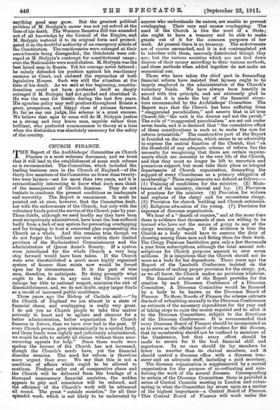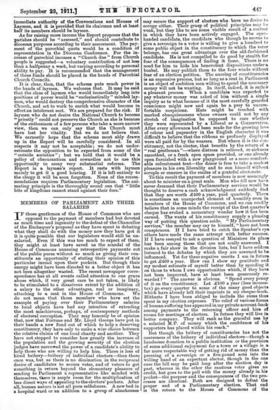CHURCH FINANCE.
TlReport of the Archbishops' Committee on Church inance is a most welcome document, and we trust that it will lead to the establishment of some such scheme as is recommended. The Committee, which included the leading business men in the Church of England—of the thirty-five members of the Committee no fewer than twenty- two were laymen—sat for more than two years, and it is extraordinarily interesting to know what such men think of the management of Church finances. They do not hesitate to condemn the present conditions as inadequate and unworthy. The Report is unanimous. It must be pointed out at once, however, that the Committee dealt, not with the endowments of the Church, but only with the voluntary funds putat the service of the Church year by year. These funds, although we need hardly say they have been most scrupulously administered, have none the less suffered badly from a lack of any system for preventing overlapping and for bringing to bear a concerted plan representing the Church as a whole. And this remains true though we do not forget the brilliant services within their limited province of the Ecclesiastical Commissioners and the administrators of Queen Anne's Bounty. If a system were introduced for the whole Church a very long step forward would have been taken. If the Church were ever disestablished a much more highly organized system of finance than exists now would be forced upon her by circumstances. It is the part of wise men, therefore, to anticipate. By doing promptly what ought to be done in any case the Church would enlarge her title to national respect, minimize the risk of disestablishment, and, we do not doubt, enjoy larger funds as a result of increased public confidence.
Three years ago the Bishop of Carlisle said :—" In the Church of England we are almost in a state of financial chaos, and overlapping is really very great.
I do ask you as Church people to take this matter seriously to heart and to agitate and clamour for a better administration, better organization for Church finances in future, than we have ever had in the past. If every Church person gave systematically to a central fund, and these funds were rightly and judiciously administered, we would be able to satisfy all claims without these ever- recurring appeals for help." Since these words were spoken the income of the Church has not increased, though the Church's needs have, yet the financial disorder remains. The need for reform is therefore more urgent than ever. We say that this is not a condition of affairs which ought to be allowed to continue. Produce order out of comparative chaos and the Church will be delivered from the bondage of a thousand unnecessary financial anxieties, the sudden appeals to pity and conscience will be reduced, and the efficiency of the Church's work will be advanced all round. The great " outside societies," for all their splendid work, which is not likely to be underrated by anyone who understands its nature, are unable to prevent overlapping. Their very zeal causes overlapping. The need of the Church is like the need of a State; she ought to have a treasury and be able to make grants out of it for the common purposes of her work. At present there is no treasury. The endowments are of course earmarked, and it is not contemplated yet to interfere with them, unevenly distributed though they are ; but the various societies which are not tied down dispose of their money according to their various methods, and these methods when added together do not make an economical one.
Those who have taken the chief part in demanding financial reform have insisted that laymen ought to be largely employed in the administration of the Church's voluntary funds. We have always been heartily in accord with this principle, and are extremely glad to find. that it is made the key of the financial struc- ture recommended by the Archbishops' Committee. The Report says that the Church has been suffering from " exaggerated parochialism," and asserts that in all true Church life " the unit is the diocese and not the parish." The evils of " exaggerated parochialism " are set out under seven heads, and it is declared that " the cumulative effect of these considerations is such as to make the case for reform irresistible." The constructive part of the Report is founded on the conclusion, which seems to us admirably to express the central function of the Church, that " on the threshold of any adequate scheme of reform lies the necessity for recognizing that there are certain require- ments which are essential to the very life of the Church, and that they must no longer be left to uncertain and precarious support, but must take their place as integral departments of Church organization, demanding the support of every Churchman as a primary obligation of membership." These requirements are defined as follows :- (1) Training of candidates for the ministry. (2) Main- tenance of the ministry, clerical and lay. (3) Provision of pensions for the ministry. (4) Provision for widows and orphans of the clergy and for necessitous clergy. (5) Provision for church building and Church extension. (6) Religious education of the young. (7) Provision for expenses of diocesan organization. We hear of a " dearth of curates," and at the same thus there is evidence that thousands of men are willing to be trained who have not the means of going to any of the clergy training colleges. If this evidence is true the Church as a, body would have to assume the duty of choosing among these men and fitting them for their work. The Clergy Pensions Institution gets only a few thousands a year from subscriptions, although the total annual sub- scriptions for Church purposes amount to over seven millions. It is iniquitous that the Church should not do more as a body for her dependents. Three years ago the Report of the Lambeth Conference insisted on the importance of making proper provision for the clergy, yet, as we all know, the Church makes no provision whatever.
The financial scheme of the Report provides for the creation by each Diocesan Conference of a Diocesan Committee. A Diocesan Committee would be financed by a body to be known as the Diocesan Board of Finance. To these Boards of Finance the scheme entrusts the task of submitting annually to the Diocesan Conferences an estimate of the necessary expenditure for the year and of taking steps to raise the money required and to allot it to the Diocesan Committees, subject to the directions of the Diocesan Conferences. It is recommended that ' every Diocesan Board of Finance should be incorporated so as to serve as the official board of trustees for the diocese, that its membership should. not be confined to members of the Conference, but that every effort should be made to secure for it the best financial skill and experience. In no case should its lay members be fewer in number than its clerical members, and it should control a diocesan office with a diocesan trea- surer and an adequate staff, including a paid secretary. The diocesan organization is supplemented by a central organization for the purpose of co-ordinating and rein- forcing the work of the several dioceses. Corresponding to certain of the Diocesan Committees there is provided a series of Central Councils meeting in London and culmi- nating in what the Committee lay stress upon as a matter of the highest importance—a Central Board. of Finance. This Central Board of Finance will work under the immediate authority of the Convocations and Houses of Laymen, and it is provided that its chairman and at least half its members should be laymen.
As for raising more income the Report proposes that the parishes should be " assessed," and should contribute to diocesan purposes according to their assessment. The pay- ment of the parochial quota would be a condition of representation in the Diocesan Conference. For the in- crease of parochial incomes a "Church due " from Church people is suggested—a voluntary contribution of not less than a halfpenny a week, but varying according to personal ability to pay. It is recommended that the management of these funds should be placed in the hands of Parochial Church Councils.
It is clear, then, that the scheme puts much power in the hands of laymen. We welcome that. It may be said that the class of laymen who would immediately leap into positions of power would be "ecclesiastically" minded lay- men, who would destroy the comprehensive character of the Church, and set to work to enrich what would become in effect an intolerant sect. We are prepared for the risk. If laymen who do not desire the National Church to become " priestly " could not preserve the Church as she is because of the enthusiasm of a few persons who take a more narrow view, then we can only say that the Church must have lost her vitality. But we do not believe that. We earnestly hope that the scheme most ably drawn up in the Report will be carefully considered. In all respects it may not be acceptable ; we do not under- estimate the opposition to be expected from some of the " outside societies " ; but we hold that it would be a policy of obscurantism and cowardice not to use this opportunity to essay very substantial reforms. The Report is a laymen's report. It rests with laymen mainly to get it a good hearing. If it is left entirely to the clergy it will be soon forgotten. None of the recom- mendations requires Parliamentary legislation. The ani- mating principle is the thoroughly sound one that " little bits of kingdoms cannot stand against their foes."







































 Previous page
Previous page